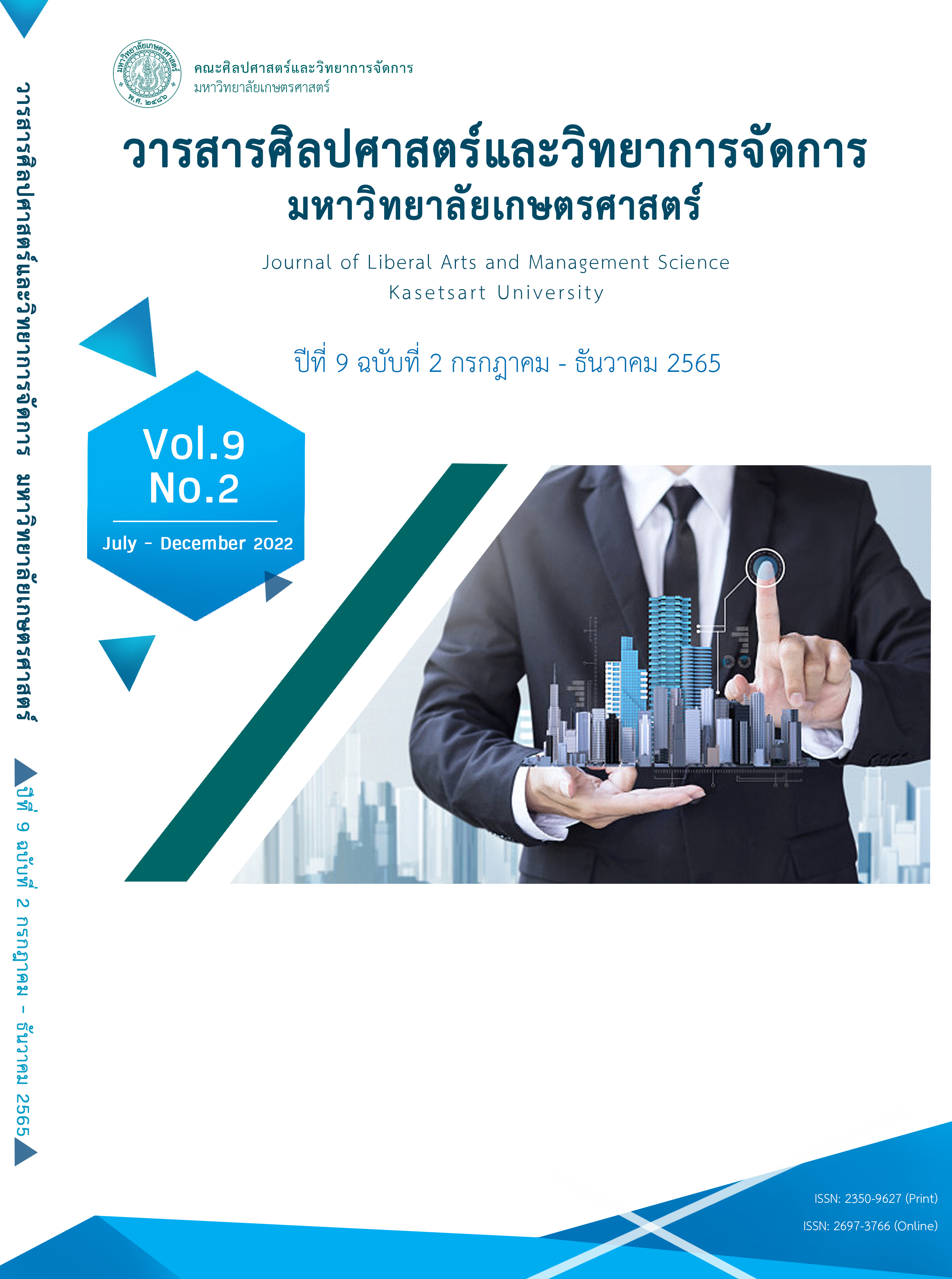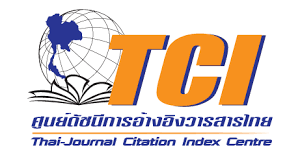A COMPARISON OF BEHAVIOURAL CHARACTERISTICS OF EXECUTIVES IN ACCOUNTING DISINFORMATION OF REGISTERED FIRMS WITH OR WITHOUT SEC’S REQUIREMENTS OF AMENDING FINANCIAL STATEMENTS AND SPECIAL AUDITING
Keywords:
earning management, financial misstatements, special auditAbstract
This study aims to analyze, compare and investigate executives’ behavioral patterns in accounting disinformation of the listed companies that are required or not required to amend the financial statements and be under special auditing by the Securities and Exchange Commission. A total of 68 cases were included with the data from 2011 to 2020 and used in statistical analysis. The results are as follows: 1) the executives of the listed companies ordered by the Securities and Exchange Commission to amend the financial statements and to be examined as a special case were found to violate more financial terms and had statistically significant difference from the group management who were not required to do so at confidence levels of 99.9 percent and 95 percent; 2) there is no difference in accounting disinformation behavior among the executives of the companies required to amend the financial statements and investigated as a special case of financial misstatement. When conducting a content-based analysis in conjunction with the SEC's news issues, it was found that most executives behaved in the same direction as accounting disinformation; and 3) The behavioral characteristics of accounting disinformation consists of 3 components: executive intent, breach of financial conditions, and executive interests. The benefits obtained from this research the presentation of executive behavior in accounting disinformation.
References
ธเรศ สันติวงศ์ไชย. (2565). รายงานการเงินและการวิเคราะห์. กรุงเทพมหานคร: บริษัทแอคทีฟ พริ้นท์ จำกัด.
นฤดมกุล พรชัย และพรรณนิภา รอดวรรณะ. (2554). การทุจริตของพนักงานในองค์กรธุรกิจ. จุฬาลงกรณ์ธุรกิจปริทัศน์, 30(130), 1-11.
ศรายุทธ เรืองสุวรรณ. (2565). ความรู้เบื้องต้นเกี่ยวกับการตกแต่งกำไร. สมุทรสาคร: บริษัท แปลนพริ้นท์ติ้ง จำกัด.
ศรายุทร เรืองสุวรรณ และสุภาวินี จีระสุวรรณ. (2564). สัญญาณเตือนภัยล่วงหน้ากับการตกแต่งกำไร: บทเรียนจากบริษัทที่ละเมิดหลักการบัญชีที่รับรองทั่วไป. วารสารวิชาชีพบัญชี, 17(53), 7-20.
สำนักงานคณะกรรมการกำกับหลักทรัพย์และตลาดหลักทรัพย์. (2565ก). ข่าว ก.ล.ต.. สืบค้นเมื่อ 21 พฤศจิกายน 2565, จาก https://www.sec.or.th/TH/Pages/News_LISTVIEW.aspx
สำนักงานคณะกรรมการกำกับหลักทรัพย์และตลาดหลักทรัพย์. (2565ข). สถิติการกล่าวโทษและเปรียบเทียบ 2556-2565. สืบค้นเมื่อ 21 พฤศจิกายน 2565, จาก http://kalasin.m-society.go.th.
สำนักงานคณะกรรมการกำกับหลักทรัพย์และตลาดหลักทรัพย์. (2565ค). งบการเงินที่อยู่ระหว่างการแก้ไข.สืบค้นเมื่อ 21 พฤศจิกายน 2565, จาก https://www.sec.or.th/TH/Pages/News_ LISTVIEW.aspx
สำนักงานคณะกรรมการกำกับหลักทรัพย์และตลาดหลักทรัพย์. (2565ง). ข้อมูลรายบริษัท/หลักทรัพย์. สืบค้นเมื่อ 21 พฤศจิกายน 2565, จาก https://classic.set.or.th/set/commonslookup.do? language=th&country=TH.
Alissa, W., Bonsall Iv, S. B., Koharki, K., & Penn Jr, M. W. (2013). Firms' use of accounting discretion to influence their credit ratings. Journal of Accounting and Economics, 55(2-3), 129-147.
Almashaqbeh, A. A., Abdul-Jabbar, H., & Shaari, H. (2018). Real earnings management and tax considerations: A conceptual analysis. International Journal of Business Management and Commerce, 3(2), 25-36.
Atwood, T. J., Drake, M. S., & Myers, L. A. (2010). Book-tax conformity, earnings persistence and the association between earnings and future cash flows. Journal of Accounting and Economics, 50(1), 111-125.
Baccouche, S., Hadriche, M., & Omri, A. (2013). The impact of audit committee multiple-directorships on earnings management: evidence from France. Journal of Applied Business Research (JABR), 29(5), 1333-1342.
Balsam, S., Irani, A. J., & Yin, Q. J. (2012). Impact of job complexity and performance on CFO compensation. Accounting Horizons, 26(3), 395-416.
Carter, K. E. (2015). The joint effect of the sarbanes-oxley act and earnings management on credit ratings. Journal of Accounting and Finance, 15(4), 77.
Cheng, Q., & Warfield, T. D. (2005). Equity incentives and earnings management. The accounting review, 80(2), 441-476.
Cohen, D. A., & Zarowin, P. (2010). Accrual-based and real earnings management activities around seasoned equity offerings. Journal of accounting and Economics, 50(1), 2-19.
Coppens, L., & Peek, E. (2005). An analysis of earnings management by European private firms. Journal of International Accounting, Auditing and Taxation, 14(1), 1-17.
Cormier, D., Houle, S., & Ledoux, M. J. (2013). The incidence of earnings management on information asymmetry in an uncertain environment: Some Canadian evidence. Journal of International Accounting, Auditing and Taxation, 22(1), 26-38.
Costello, A. M. & Wittenberg-Moerman, R. (2011). The impact of financial reporting quality on debt contracting: Evidence from internal control weakness reports. Journal of Accounting Research, 49(1), 97-136.
Dichev, I. D., Graham, J. R., Harvey, C. R., & Rajgopal, S. (2013). Earnings quality: Evidence from the field. Journal of accounting and economics, 56(2-3), 1-33.
Cressey, D. R. (1970). Organized crime and inner-city youth. Crime & Delinquency, 16(2), 129-138.
Duong L., & Evans J. (2015). CFO Compensation: Evidence from Australia. Pacific basin Finance Journal,
(PA), 425-443.
Fama, E. F., & Jensen, M. C. (1983). Separation of ownership and control. The journal of law and Economics, 26(2), 301-325.
Frydman, C., & Saks, R. E. (2010). Executive compensation: A new view from a long-term perspective, 1936–2005. The Review of Financial Studies, 23(5), 2099-2138.
Goncharow, I., & Zimmermann, J. (2006). Earnings management when incentives compete: the role of tax accounting in Russia. Journal of International Accounting Research, 5(1), 41-65.
Graham, J. R., Harvey, C. R., & Rajgopal, S. (2005). The economic implications of corporate financial reporting. Journal of accounting and economics, 40(1-3), 3-73.
Ifada, L. M. & Wulandari, N. (2015). The effect of deferred tax and tax planning toward earnings management practice (empirical study on non-manufacturing companies listed in Indonesia Stock Exchange in the period of 2008-2012. International Journal of Organizational Innovation, 8(1), 352-380.
Jensen, M. C., & Meckling, W. H. (1976). Theory of the firm: Managerial behavior, agency costs, and ownership structure. Journal of Financial Economics, 3(1976), 305-360.
Jones, J. J. (1991). Earnings management during import relief investigations. Journal of accounting research, 29(2), 193-228.
Kuč, V., & Kaličanin, Đ. (2021). Determinants of the capital structure of large companies: Evidence from Serbia. Economic Research-Ekonomska Istraživanja, 34(1), 590-607. https://doi.org/10.1080/1331677X.2020.1801484
Maslow, A. (1970). Motivation and Personality. New York: Harper and Row.
Meek, G. K., Rao, R. P., & Skousen, C. J. (2007). Evidence on factors affecting the relationship between CEO stock option compensation and earnings management. Review of accounting and finance, 6(3), 304-323.
Nalarreason, K. M., Sutrisno, T., & Mardiati, E. (2019). Impact of leverage and firm size on earnings management in Indonesia. International Journal of Multicultural and Multireligious Understanding, 6(1), 19-24.
Nam, H. J., Choi, J. H., Comprix, J., & Kwon, H. H. (2012). Firm location and earnings management: Korean evidence. Asia-Pacific Journal of Accounting & Economics, 19(3), 292-317.
Ngamchom, N. (2018). Opportunistic or beneficial earnings management of good corporate governance score enterprises in Thailand. Thailand and The World Economy, 36(2), 52-78.
Nursetya, R. P., & Hidayati, L. N. (2020). How does firm size and capital structure affect firm value?. Journal of Management and Entrepreneurship Research, 1(2), 67-76.
Hart, O. D. 1988). Incomplete Contracts and the Theory of the Firm. Journal of Law, Economics and Organization, 4(1), 119-139.
Panda, B., & Leepsa, N. M. (2017). Agency theory: Review of theory and evidence on problems and perspectives. Indian Journal of Corporate Governance, 10(1), 74-95.
Roychowdhury, S. (2006). Earnings management through real activities manipulation. Journal of Accounting and Economics, 42(3), 335-370.
Sari, D. K., Utama, S., & Rossieta, H. (2017). Tax avoidance, related party transactions, corporate governance and the corporate cash dividend policy. Journal of Indonesian Economy and Business: JIEB., 32(3), 190-208.
Shuto, A. (2007). Executive compensation and earnings management: Empirical evidence from Japan. Journal of International Accounting, Auditing and Taxation, 16(1), 1-26.
Singleton, T. W., & Singleton, A. J. (2010). Fraud auditing and forensic accounting (Vol. 11). New York: John Wiley & Sons.
Sirait, F., & Siregar, S. V. (2014). Dividend payment and earnings quality: evidence from Indonesia. International Journal of Accounting and Information Management, 22(2), 103-117.
Trombetta, M., & Imperatore, C. (2014). The dynamic of financial crises and its non-monotonic effects on earnings quality. Journal of Accounting and Public Policy, 33(3), 205-232.
Turner, M. J., & Guilding, C. (2011). An investigation of the motivation of hotel owners and operators to engage in earnings management. Qualitative Research in Accounting and Management, 8(4), 358–381.
Watts, R. & Zimmerman J. (1986). Positive Accounting Theory. Prentice-Hall: Englewood Cliffs, NJ.
Zang, A. Y. (2012). Evidence on the trade-off between real activities manipulation and accruals-based earnings management. The Accounting Review, 87(2), 675-703.






